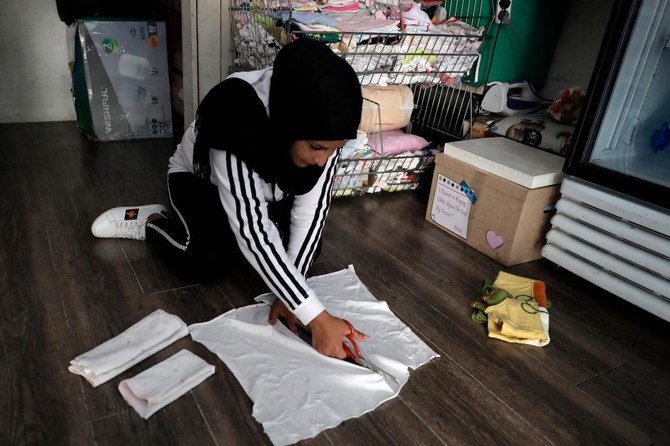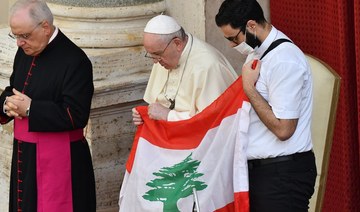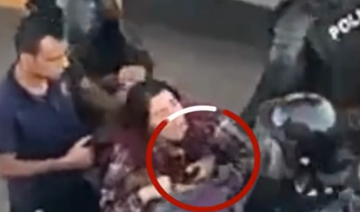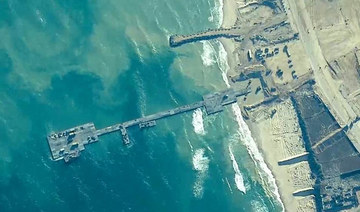BEIRUT: With prices soaring in crisis-hit Lebanon, Sherine can no longer afford sanitary pads. So instead each month, she is forced to make her own using baby nappies or even rags.
“With all the price hikes and the frustration of not being able to manage, I’d rather stop having my period altogether,” the 28-year-old told AFP, tears rolling down her cheeks.
The price of menstrual pads, the vast majority of which are imported, has risen by almost 500 percent since the start of a financial crisis the World Bank has dubbed likely one of the world’s worst since the 1850s.
Packs of sanitary towels now cost between 13,000 and 35,000 Lebanese pounds — between $8.60 and $23 at the official exchange rate — up from just 3,000 pounds ($2) before the economic crisis.
With more than half the population living in poverty, tens of thousands of women are now on a desperate hunt for affordable alternatives.
Sherine initially turned to cheap sanitary pads that she said caused skin irritation, but even those have become too costly.
“Right now, I’m using towels and pieces of cloth,” she said.
“At first, I felt defeated,” the young mother told AFP, her hair tied up in a bun.
“But I chose to put my daughter first. I would rather buy her milk. As for me, I can make do.”
But that has often meant repurposing some of the diapers a charity shop has given her for her toddler, cutting each in half to create two separate pads.
She said the process has been one of trial and error.
In the beginning, “I was always having to check if (blood) had leaked and stained my pants,” she said.
The Lebanese pound has lost more than 90 percent of its value against the dollar on the black market since the autumn of 2019, and Lebanese earning salaries in the local currency have seen their buying power plummet.
The government has subsidised essential goods including medicine, fuel and flour to ease the blow, but has come under fire for failing to include pads on its list.
In the absence of state support, the Dawrati (My Period) initiative was launched last year to address rising period poverty in Lebanon.
The group distributes free menstrual products to women in need, including some who were once members of the fast-vanishing middle class.
“Middle-class women also need them — like a bank employee whose salary in Lebanese pounds is no longer enough to get by,” said co-founder Line Masri.
According to Dawrati, half of women suffering from period poverty are using newspaper, toilet paper or old rags instead of pads, while two-thirds of adolescent girls have no means of purchasing sanitary products.
Yet the association is struggling to keep up.
“We aren’t able to meet demand... because donations have declined significantly,” Masri said.
At a Beirut charity store initially set up to distribute free clothes to the needy, employee Izdihar said a growing number of women were struggling to manage their periods.
Izdihar said she even sometimes had to resort to giving baby diapers from the store to her three daughters, aged 12 to 14.
Her youngest, who started menstruating this year, was having trouble adapting.
“She’s stopped leaving the house when she has her period,” Izdihar said.
Activists are seeking to produce viable alternatives to disposable pads.
In the Shatila Palestinian refugee camp in Beirut, international NGO Days For Girls and local partner WingWoman Lebanon are training refugee women to stitch reusable sanitary pads out of colorful cloth.
Each includes a protective shield and absorbent liner, and can be washed and reused for up to three years.
The project already distributes them to Lebanon’s most vulnerable communities, including in Syrian refugee camps.
Rima Ali, a Syrian mother of six, was among dozens learning to make the pads.
The 45-year-old, who fled the war in Syria nine years ago, said she used to buy only the cheapest pads for herself and her three daughters, but they had become prohibitively expensive.
With her family running through around six packets a month, reusable pads seemed like a much better option.
“Back in Syria, there were some rough days when we couldn’t even afford to buy bread,” she said. “We used to cut up material to use” instead of sanitary pads.
“I never thought we would have to relive it all over again.”
Diapers and rags: Lebanon crisis plunges women into period poverty
https://arab.news/9wthu
Diapers and rags: Lebanon crisis plunges women into period poverty

- The Lebanese pound has lost more than 90 percent of its value against the dollar on the black market since the autumn of 2019
UN has got only 12 percent of funds sought for war-wracked Sudan

“In Sudan, half of the population, 25 million people, need humanitarian aid. Famine is closing in. Diseases are closing in“
GENEVA: The United Nations warned on Friday that it had only received 12 percent of the $2.7 billion being sought for war-wracked Sudan, adding that “famine is closing in.”
Tens of thousands of people have died and millions have been displaced in Sudan since war broke out in April 2023 between the army and the paramilitary Rapid Support Forces (RSF).
The United Nations says more than 1.4 million people have fled the country.
“It is a catastrophically underfunded appeal,” Jens Laerke, spokesman for the Office for the Coordination of Humanitarian Affairs (OCHA) told reporters.
“Without more resources coming in fast, humanitarian organizations won’t be able to scale up in time to stave off famine and prevent further deprivation,” he said.
“In Sudan, half of the population, 25 million people, need humanitarian aid. Famine is closing in. Diseases are closing in. The fighting is closing in on civilians, especially in Darfur.”
The United Nations has expressed growing concern in recent days over reports of heavy fighting in densely populated areas as the RSF seeks control of El-Fasher, the last major city in the western Darfur region not under its control.
“Now is the time for donors to make good on pledges made, step up and help us help Sudan and be part of changing the current trajectory that’s leading toward the cliff’s edge. Don’t be missing in action,” he said.
Shible Sahbani, the UN’s World Health Organization representative in Sudan, said: “Thirteen months of war in Sudan, nine million people displaced which represent around 17 percent of the population and the largest internal displacement crisis in the world today.
“This conflict has... nearly destroyed the health system which is almost collapsed now. Close to 16,000 people have died due to this war, 33,000 have been injured,” she said, speaking from Port Sudan.
Sahbani said the real toll was “probably much higher.”
The RSF and Sudan’s armed forces are seen as both wanting to secure a battleground victory and each side has received support from outside players.
The UN human rights chief Volker Turk this week separately spoke to Lt. General Abdel Fattah Al-Burhan, president of the Transitional Sovereignty Council, and General Mohamed Hamdan Dagalo, Commander of the Rapid Support Forces.
“He urged them both to act immediately — and publicly — to de-escalate the situation,” UN human rights spokeswoman Ravina Shamdasani said.
Israeli military finds bodies of 3 hostages in Gaza, including Shani Louk, killed at music festival

- A photo of the 22-year-old Shani’s twisted body in the back of a pickup truck ricocheted around the world
- The military identified the other two bodies found as those of a 28-year-old woman, Amit Buskila, and a56-year-old man, Itzhak Gelerenter
JERUSALEM: Israeli military says its troops in Gaza found the bodies of three Israeli hostages taken by Hamas during its Oct. 7 attack, including German-Israeli Shani Louk.
A photo of the 22-year-old Shani’s twisted body in the back of a pickup truck ricocheted around the world and brought to light the scale of the militants’ attack on communities in southern Israel.
The military identified the other two bodies found as those of a 28-year-old woman, Amit Buskila, and a56-year-old man, Itzhak Gelerenter. Military spokesman Rear Adm. Daniel Hagari said all three were killed by Hamas at the Nova music festival, an outdoor dance party near the Gaza border, and their bodies taken into the Palestinian territory.
The military did not give immediate details on where their bodies were found.
Hamas-led militants killed around 1,200 people, mainly civilians, and abducted around 250 others in the Oct. 7 attack. Around half of those have since been freed, most in swaps for Palestinian prisoners held by Israel during a weeklong ceasefire in November.
Israel says around 100 hostages are still captive in Gaza, along with the bodies of around 30 more. Israel’s campaign in Gaza since the attack has killed more than 35,000 Palestinians, according to Gaza health officials.
Iran arrests 3 Europeans at ‘Satanist’ gathering along with 260 others, Tasnim says

- Those detained comprised 146 men and 115 women and that alcohol and psychedelic drugs were seized.
DUBAI: Iranian security forces have arrested more than 260 people, including three European nationals, at a “Satanist” gathering west of the capital Tehran, the semi-official new agency Tasnim reported on Friday.
“Satanist network broken up in Tehran, arrests of three European nationals,” Tasnim wrote, adding that those detained comprised 146 men and 115 women and that alcohol — banned under Iran’s Islamic laws — and psychedelic drugs were seized.
The report did not give the nationality of the Europeans.
Spain PM will Wednesday announce date to recognize Palestinian state

- Sanchez said in March that Spain and Ireland, along with Slovenia and Malta had agreed to take the first steps toward recognition of a Palestinian state
MADRID: Spanish Prime Minister Pedro Sanchez said Friday he will on Wednesday announce the date on which Madrid will recognize a Palestinian state along with other nations.
“We are in the process of coordinating with other countries,” he said during an interview with private Spanish television station La Sexta when asked if this step would be taken on Tuesday as announced by EU foreign policy chief Josep Borrell.
Sanchez said in March that Spain and Ireland, along with Slovenia and Malta had agreed to take the first steps toward recognition of a Palestinian state alongside Israel, seeing a two-state solution as essential for lasting peace.
Borrell told Spanish public radio last week that Spain, Ireland and Slovenia planned to symbolically recognize a Palestinian state on May 21, saying he had been given this date by Spanish Foreign Minister Jose Manuel Albares.
Ireland’s Foreign Minister Micheal Martin said Tuesday that Dublin was certain to recognize Palestinian statehood by the end of the month but the “specific date is still fluid.”
So far, 137 of the 193 UN member states have recognized a Palestinian state, according to figures provided by the West Bank-based Palestinian Authority.
Despite the growing number of EU countries in favor of such a move, neither France nor Germany support the idea. Western powers have long argued such recognition should only happen as part of a negotiated peace with Israel.
Israel army says civilians torched Gaza-bound aid truck in West Bank

- Driver as well as Israel soldiers were injured in the attack
JERUSALEM: Israel’s military said Friday that “dozens of Israeli civilians” set fire the previous evening to an aid truck in the occupied West Bank headed for war-torn Gaza.
Local media reported that Israeli settlers were behind the attack, which the army said injured the driver as well as Israeli soldiers.
The incident took place near Kokhav Hashahar, an Israeli settlement in the central West Bank, a territory occupied by Israel since 1967.
According to the army, Israeli soldiers intervened to “separate the Israeli civilians from the attacked Israeli driver” and provided medical assistance.
The group then “responded with violence,” and three Israeli soldiers were “lightly injured,” the army said, condemning “all forms of violence against its soldiers and security forces.”
On Monday, dozens of people blocked and vandalized a convoy of aid trucks driving to the Gaza Strip.
Israeli media identified them as part of a far-right group opposed to allowing aid into Gaza.
The trucks were attacked in Israel, shortly after passing through the Tarqumiya checkpoint from the West Bank.
Images posted on social media show Israeli soldiers watching on as the attackers destroy the aid.
The latest incident comes just hours after the army said on Thursday that the Tarqumia and Beitunia checkpoints “now also function as inspection points for aid” destined for Gaza.
Jordanian authorities said “Israeli extremists” in the West Bank attacked two aid convoys sent on May 1 from Jordan and another convoy of 35 trucks sent on May 7.
Israel has been fighting their bloodiest war ever in Gaza since the Palestinian militants attacked Israel on October 7.
Despite the United Nations warning of looming famine, Israeli authorities have tightly controlled much needed humanitarian aid into Gaza over the course of more than seven months of war.
Very little aid has made it through Kerem Shalom crossing in southern Gaza, and Rafah crossing has been completely shut since Israeli troops took control of the area last week.
Israel has vowed to defeat remaining Hamas forces in the southern city of Rafah, which it says is the last bastion of the group whose October 7 attack triggered the war.
The Hamas attack on southern Israel resulted in the deaths of more than 1,170 people, mostly civilians, according to an AFP tally based on official Israeli figures.
More than 35,303 Palestinians, mostly civilians, have been killed in Gaza since the war broke out, according to data provided by the health ministry in the Hamas-run territory.




















